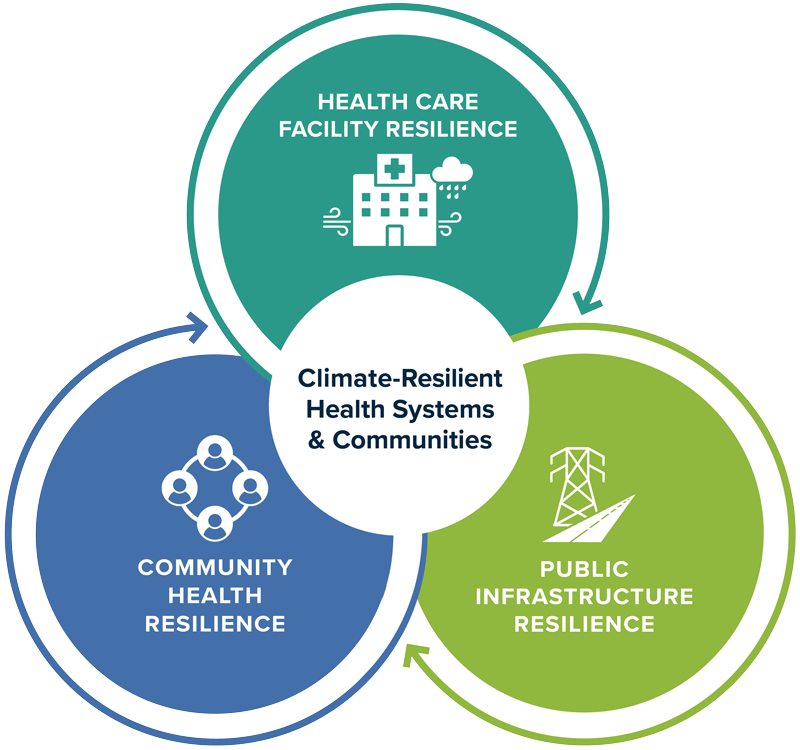
The challenge
Climate change impacts not only human health but also the delivery of health care and the ability of communities to rebound from extreme weather events and changes in disease prevalence. The most vulnerable – children, the elderly, persons with disabilities, low-income communities, and communities of color – bear a disproportionate burden of the impact and are the least equipped to recover. Hospitals on the front lines of the climate crisis must adapt both their infrastructure and service delivery to remain effective in the face of new threats. And they must explore the hospital’s role and investments needed to build resilience in their communities. Events over the past decade – such as Hurricane Katrina, Superstorm Sandy, and the Northern California Camp Fire – have demonstrated that many hospitals and communities are not prepared for new weather extremes and health needs.
Our vision

Health Care Without Harm envisions hospitals serving as anchors for community health, equity, and resilience. Building resilience is the process of adapting existing infrastructure and community planning to be able to respond to a changing climate reality. Hospitals must assess and retrofit their facilities and existing infrastructure to increase reliability so people have access to care during extreme weather events. Hospitals must also partner with their communities to ensure energy, transportation, and supply chain systems are resilient.
Increasingly, health systems are expanding beyond traditional clinical boundaries, moving from treating individual patients with acute and chronic diseases to addressing underlying social, economic, and environmental conditions that cause poor health. Often the largest employer in communities, hospitals enable healing and regeneration after a crisis by investing in renewable energy, local businesses, and environmental protection. With this approach, health care moves beyond doing “less harm” – i.e., reducing its own negative environmental impact – to a future where the sector “heals” by supporting the transition to healthy, equitable communities where all people can thrive. Working together and in partnership with the communities they serve, the health sector is uniquely situated to underpin the transition to a society where health is a shared value supported by people, communities, markets, and policy.
Health care institutions can leverage their social, political and economic influence to address social and environmental determinants of health and help communities improve their ability to adapt to and recover from climate impacts. Learn more in our paper, Climate Resilience for Health Care and Communities: Strategies and Case Studies.
Our work
Health Care Without Harm works with health systems to adapt to a changing climate through programs that improve infrastructure resilience, build cross-sector collaboration in communities, and provide resources to link sustainability to broader health care quality initiatives and business objectives.
The Climate and Health program works with hospitals and health systems to:
- Integrate climate risks into facility and regional emergency preparedness and implementation plans.
- Assess and take action on infrastructure vulnerabilities to extreme weather shocks and stresses.
- Invest in distributed renewable energy systems that empower consumers, enhance community resilience, and transition away from fossil fuels.
- Engage with local communities to understand vulnerabilities and the role that health systems can play in enhancing resilience.
- Establish creative partnerships and programs that mitigate greenhouse gas emissions and enhance community health. U.S. Health Care Climate Council members have undertaken programs such as employee solar energy systems, investments in healthy and affordable housing, and community tree-planting initiatives.
- Convene community resilience summits to define the most relevant and beneficial areas of collaboration to improve climate resilience.
- Utilize the community benefit process and health needs assessment to implement projects that address top health needs and strengthen resilience.
- Invest and participate in multi-sector community partnerships that leverage the hospital supply chain to create local wealth and increase resilience.
Tools and resources
Working on reducing a hospital or health system’s climate impact doesn’t happen in a silo. Our most successful health systems are part of the Practice Greenhealth 🡥 network, where they learn about and share strategies for climate mitigation, resilience, and leadership.
The Climate and Health program has collaborated with various partners to develop the following resources:
- Partnering for resilience: A practical guide to community-based disaster planning for health care
- Climate Resilience for Health Care and Communities: Strategies and Case Studies
- Primary protection: Enhancing health care resilience for a changing climate 🡥
- Safe haven in the storm: Protecting lives and margins with climate-smart health care
- Resilience 2.0: Health care’s role in anchoring community health and resilience
- Executive summary: Delivering community benefit: Climate and health 🡥
- Customizable RFP for Assessing Climate-Related Infrastructure Risks
Take action
Sign the Health Sector CARES (Climate Action, Resilience, and Equity Solutions) Pledge to show your organization's commitment to a healthier, more resilient future.
By pledging to reduce environmental impact and enhance energy efficiency, emergency preparedness, and resilience, your organization advances the health of patients, staff, and the broader community – while also demonstrating leadership and reinforcing health care’s vital role as a pillar of community well-being.
Contact
We want to hear from you! For more information, please contact us at climate@hcwh.org.